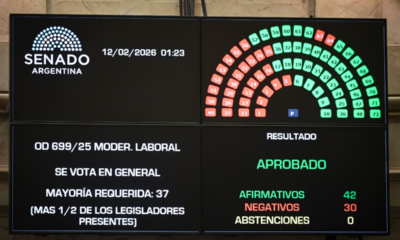INTERNACIONAL
What to know about Judge Boasberg, the Trump foe at center of DOJ complaint

NEWYou can now listen to Fox News articles!
The Justice Department on Monday accused U.S. District Judge James Boasberg of misconduct, escalating the Trump administration’s long-running feud against federal judges who have blocked or paused some of the president’s most sweeping policy priorities.
The complaint, reviewed by Fox News Digital, centers on remarks Boasberg allegedly made during a March 11 meeting of the Judicial Conference of the United States — the national policymaking body for the federal courts, which meets twice per year and is headed up by Supreme Court Chief Justice John Roberts.
During that meeting, the complaint says, Boasberg «attempted to improperly influence Chief Justice Roberts» and the roughly two dozen other federal judges at the conference by suggesting that the Trump administration could «disregard rulings of federal courts,» and trigger «a constitutional crisis.»
The complaint was sent at the direction of U.S. Attorney General Pam Bondi and signed by her chief of staff, Chad Mizelle.
APPEALS COURT BLOCKS TRUMP ADMIN’S DEPORTATION FLIGHTS IN ALIEN ENEMIES ACT IMMIGRATION SUIT
U.S. Attorney General Pam Bondi speaks alongside President Donald Trump on recent Supreme Court rulings in the briefing room at the White House on June 27, 2025 in Washington, D.C. (Joe Raedle/Getty Images)
Fox News Digital could not independently verify Boasberg’s reported remarks at the March 11 meeting, and his office did not immediately respond to a request for comment.
Officials have argued the reported remarks were an attempt to improperly prejudice or influence Roberts and said they «undermined the integrity and impartiality of the federal judiciary.»
The complaint asked, not for the first time, that Boasberg be removed from presiding over J.G.G. v. Trump, a lawsuit filed in March by lawyers for the ACLU and others on behalf of the hundreds of immigrants who were summarily deported to El Salvador’s CECOT prison under the auspices of a wartime immigration law.
The complaint — and its request to remove Boasberg from the most consequential immigration case of President Donald Trump’s second term — is certain to test the already fraught relationship between the administration and the courts.
Since Trump’s inauguration in January, senior administration officials have excoriated dozens of so-called «activist» judges who have blocked or paused some of Trump’s sweeping executive orders from taking force.
Notably, the pro-Trump legal group founded by White House aide Stephen Miller attempted to sue Roberts earlier this year for his role overseeing the U.S. Judicial Conference, arguing in a long-shot legal bid that the group’s actions went beyond the scope of what they allege are the «core functions» of the judiciary.
Boasberg, in particular, has emerged as one of Trump’s biggest public foes. On March 15, several days after he allegedly made the remarks included in the DOJ complaint, Boasberg issued a temporary restraining order seeking to block Trump’s use of a 1798 wartime-era immigration law, the Alien Enemies Act, to summarily deport hundreds of Venezuelan nationals to El Salvador.
TRUMP-ALIGNED GROUP SUES CHIEF JUSTICE JOHN ROBERTS IN EFFORT TO RESTRICT POWER OF THE COURTS
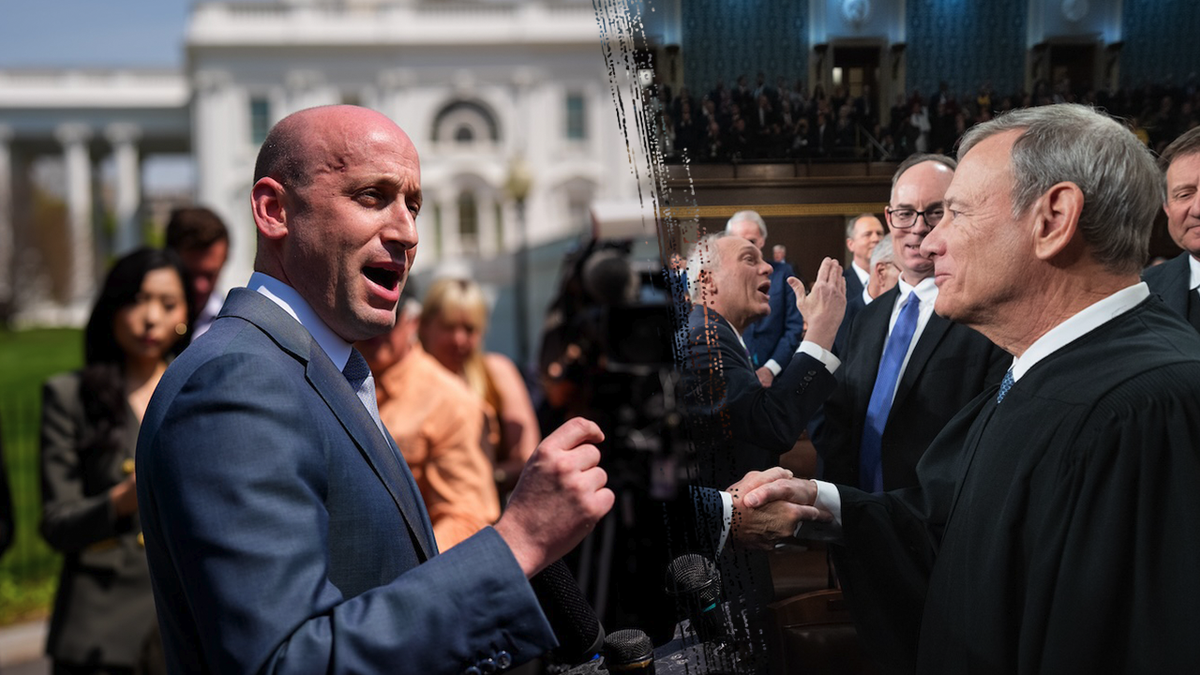
White House adviser Stephen Miller, left, and Supreme Court Chief Justice John Roberts. (Getty Images)
Boasberg ordered all planes bound for El Salvador to be «immediately» returned to U.S. soil, which did not happen, and later, ordered a new investigation to determine whether the Trump administration had complied with his orders. In April, he ruled that the court had grounds to move on possible contempt proceedings, though that ruling was stayed by a higher appeals court, which has yet to consider the matter.
His March 15 order touched off a complex legal saga that ultimately spawned dozens of deportation-related court challenges across the country — though the one brought before Boasberg was the very first — and later prompted the Supreme Court to rule, on two separate occasions, that the hurried removals had violated migrants’ due process protections under the U.S. Constitution.
100 DAYS OF INJUNCTIONS, TRIALS AND ‘TEFLON DON’: TRUMP SECOND TERM MEETS ITS BIGGEST TESTS IN COURT
However, it also placed Boasberg squarely in the crosshairs of Trump officials — including the president — as the administration moved to unleash a blitz of executive orders and target judges who tried to block them.
Their attacks have centered closely on the behavior of several judges — but no one more so than Boasberg, an Obama appointee who was originally tapped by then-President George W. Bush in 2002 to be an associate judge of the District of Columbia Superior Court.
White House press secretary Karoline Leavitt has repeatedly used her podium this year to rail against «radical left-wing judges,» accusing them of overstepping their authority and undermining presidential powers.
Trump suggested earlier this year that Boasberg could be impeached for his actions, describing the judge as a «troublemaker and agitator»— and prompting a rare public rebuke from Justice Roberts.
For some, the complaint seems to be well-timed: Boasberg ordered the Justice Department and the ACLU to court for a status hearing last week to determine the status of the 252 CECOT plaintiffs who were deported to Venezuela from El Salvador as part of a prisoner exchange with Venezuelan President Nicholas Maduro.
GORSUCH, ROBERTS SIDE WITH LEFT-LEANING SUPREME COURT JUSTICES IN IMMIGRATION RULING
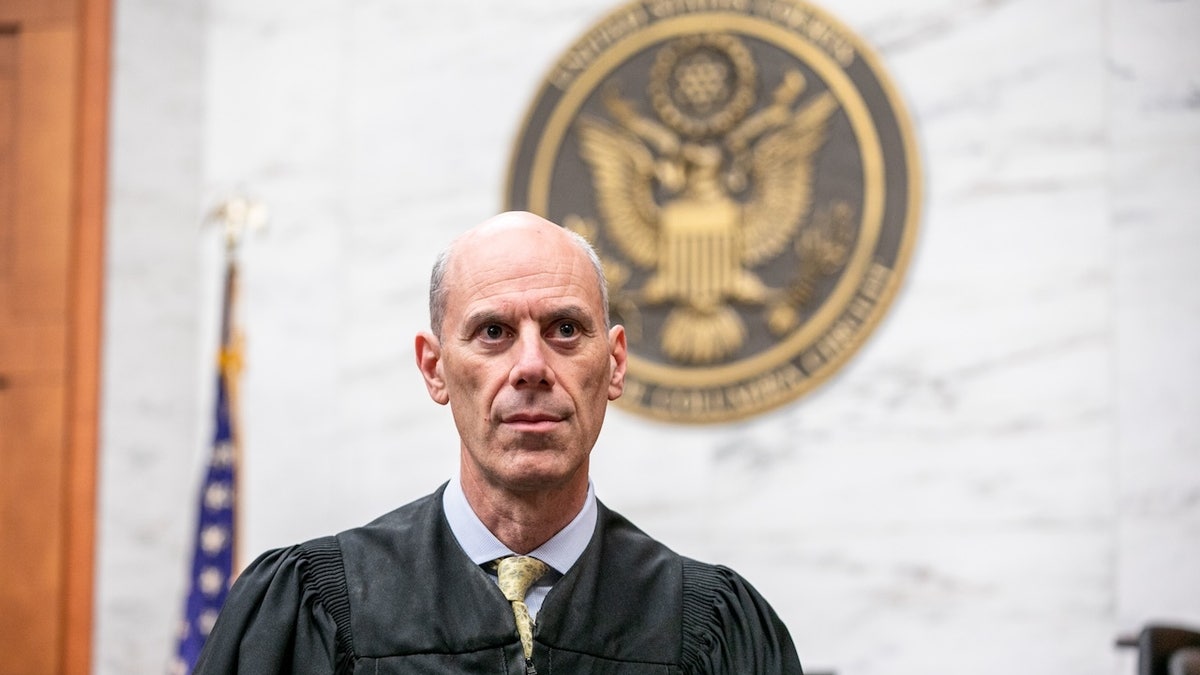
Judge James Boasberg’s March 15 order prompted a complex legal saga that has spawned dozens of deportation-related lawsuits nationwide. (Getty Images)
Boasberg ended the hearing by ordering the administration and the ACLU lawyers to submit a joint status update to the court on Thursday, Aug. 7, and to continue to do so every two weeks thereafter, as he weighs what options the court has to order relief.
When asked at a status hearing in court last week whether the Justice Department would comply with the court’s orders, DOJ lawyer Tiberius Davis said they would, «if it was a lawful order.»
Davis added that DOJ would likely seek an appeal from a higher court.
Notably, it’s not the first time the Trump administration has tried to have Boasberg removed from overseeing the case.
The Justice Department in March asked the D.C. Circuit Court of Appeals to remove Judge Boasberg from presiding over the Alien Enemies Act case and have it reassigned to another federal judge. The appeals court never took action in response to the request.
SHELTERS, JESUS, AND MISS PAC-MAN: US JUDGE GRILLS DOJ OVER TRANS POLICY IN DIZZYING LINE OF QUESTIONING
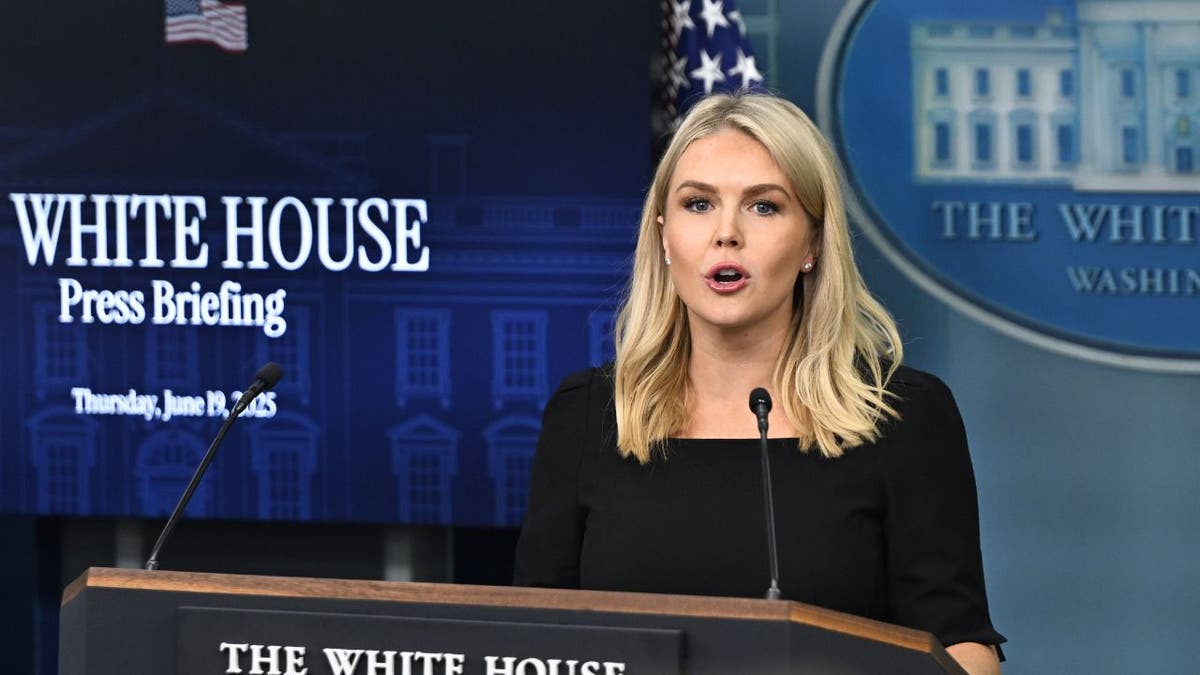
White House press secretary Karoline Leavitt speaks to reporters at a press briefing. (Celal Gunes/Anadolu via Getty Images)
The White House has repeatedly argued that lower court judges like Boasberg should not have the power to block what it calls the president’s lawful agenda — though the judges say Trump’s actions violate the law.
CLICK HERE TO GET THE FOX NEWS APP
Still, the first six months of Trump’s second term have been marked by repeated court clashes, as the administration pushes ahead with its agenda and targets those standing in its way.
That sentiment was echoed by former acting ICE Director and current border czar Tom Homan. ‘I don’t care what the judges think. I don’t care what the left thinks,» he said earlier this year in an interview. «We’re coming. Another fight. Every day.»
INTERNACIONAL
Estados Unidos reclama una Europa fuerte pero subordinada a la visión y liderazgo de Donald Trump

Marco Rubio no es JD Vance ni Donald Trump. Rubio no insulta al hablar y no desvaría. Rubio mantiene un decoro diplomático en público que ya es poco habitual en la Administración Trump. El discurso del jefe de la diplomacia estadounidense este sábado en la Conferencia de Seguridad de Múnich se esperaba con expectativas después de que el año pasado el vicepresidente JD Vance se dedicara a insultar a los dirigentes europeos y a defender a partidos políticos neofascistas.
Pero el guante de seda de Rubio esconde el mismo puño de acero. Su discurso, conciliador en las formas, fue prácticamente igual en el fondo e ideológicamente muy alejado del consenso europeo hasta el punto de que Rubio parece extrañar una suerte de imperialismo occidental que Europa dejó atrás con las guerras mundiales hace casi un siglo.
Rubio empezó conciliando: “No buscamos separarnos, sino revitalizar una vieja amistad y renovar la mayor civilización de la historia humana”. Pero Rubio choca de frente con los europeos. Para ellos, el viejo orden mundial que dan por muerto a su pesar, como hizo el viernes el alemán Friedrich Merz, es un orden mundial de reglas y multilateralismo, el orden mundial de los organismos de Naciones Unidas. Rubio habla de un orden “civilizatorio” compatible por igual con democracias y con dictaduras.
Rubio parece tratar a los europeos como a niños a los que debe devolver al camino de la rectitud. Su mensaje les dice que se equivocan luchando contra la crisis climática y les repite el argumento (falso en los datos) de las extremas derechas de que están permitiendo que se reemplace a la población europea blanca y cristiana por poblaciones árabes y negras de credo musulmán: “La migración masiva no es ni fue algo de escasas consecuencias, ya que está transformando y desestabilizando sociedades en todo Occidente”.
Sin migraciones (y los datos no justifican hablar de masivas porque en Europa no entra al año ni el equivalente al 0,5% de la población europea) Europa ya estaría perdiendo población. “En la búsqueda de un mundo sin fronteras, abrimos nuestras puertas a una ola de migración masiva sin precedentes (en realidad en Europa y en Estados Unidos hubo movimientos migratorios mucho mayores en el siglo XIX y principios del XX) que amenaza la cohesión de nuestras sociedades, la continuidad de nuestra cultura y el futuro de nuestros pueblos”.
La transición energética europea parece molestar especialmente en Washington, a pesar de que son los países que más rápido van en el cambio a las renovables (los escandinavos o España) los que más barata tienen la electricidad, tanto industrial como para las familias. Rubio dijo que “para apaciguar el culto al clima (como si fuera una realidad falsa la crisis climática), nos hemos impuesto políticas energéticas que empobrecen a nuestra gente”.
El discurso de Rubio es más sofisticado que los de Donald Trump y JD Vance, pero es en el fondo el mismo discurso. No es Churchill ni Barack Obama, pero el nivel de los últimos discursos estadounidenses era tal que Rubio parece un estadista. Lo dice de otras formas, pero dice lo mismo: Estados Unidos seguirá apoyando a las extremas derechas europeas y trabajando para debilitar a la Unión Europea, a la que considera origen de todos los males.
Rubio habla de Occidente, pero se refiere a Europa cuando dice que tras las guerras mundiales se fue hacia una “peligrosa ilusión” y hacia “un orden global basado en reglas que reemplazarían al interés nacional y que viviríamos en un mundo sin fronteras, donde todos se convertirían en ciudadanos del mundo. Esta fue una idea absurda”.
Es precisamente la idea en la base de la construcción política de la Unión Europea. Eliminar fronteras, compartir moneda y algunas Fuerzas Armadas, elementos esenciales de soberanía, y compartir ciudadanía para hacer imposible otra guerra europea.
La bronca siguió: “Subcontratamos cada vez más nuestra soberanía a instituciones internacionales, mientras muchas naciones invirtieron en enormes estados de bienestar a costa de su capacidad de defensa”.
El mensaje es: Europa debe ser nuestra aliada, pero según los términos que dicte el presidente Trump. Estados Unidos seguirá comprometido con la OTAN, pero según cómo dicte el presidente Trump. Los intereses e ideas de los europeos no tienen ninguna importancia en la nueva relación que propone Rubio en Múnich. El secretario de Estado fue cristalino al explicarlo: “Con el presidente Trump, Estados Unidos asumirá una vez más la tarea de renovación y restauración, y aunque estamos preparados, si es necesario, para hacerlo solos, es nuestra preferencia y es nuestra esperanza hacerlo con ustedes, nuestros amigos aquí en Europa”.
Por primera vez en un siglo, una Administración estadounidense no dice que le une a Europa la defensa de los valores liberales de la democracia y los derechos humanos, sino “una historia compartida, fue cristiana, cultura, herencia, idioma, ascendencia y los sacrificios que nuestros antepasados hicieron juntos por la civilización común de la que hemos heredado”.
Europa debe ser nuestra aliada, repite Rubio, pero deja claro que lo será al dictado de Donald Trump, no como una relación entre iguales.
Rubio cerró criticando a quienes criticaron por ilegal la intervención en Venezuela porque violaba la legalidad internacional: “Esta es la vía en la que el presidente Trump y Estados Unidos se han embarcado. Es la vía a la que pedimos que los europeos se unan”. Vasallos, no aliados.
INTERNACIONAL
Rubio blasts ‘world without borders’ fantasy, warns mass migration threatens Western civilization

NEWYou can now listen to Fox News articles!
U.S. Secretary of State Marco Rubio on Saturday blasted the idea of a «world without borders,» warning European leaders that unchecked mass migration is destabilizing Western civilization and eroding national sovereignty.
Speaking at the annual Munich Security Conference, Rubio criticized the post-Cold War belief that the world had reached the «end of history» — an era in which liberal democracy would spread, and national borders would fade — calling it a «dangerous delusion.»
«This was a foolish idea that ignored both human nature, and it ignored the lessons of over 5000 years of recorded human history, and it has cost us dearly,» Rubio said.
Rubio stressed that border security is not rooted in exclusion, but in responsibility.
TRUMP PLEDGES TO REASSERT MONROE DOCTRINE TO RESTORE AMERICAN POWER
U.S. Secretary of State Marco Rubio delivers a keynote speech at the 62nd Munich Security Conference on Feb. 14, 2026 in Munich, Germany. (Johannes Simon/Getty Images)
«We must also gain control of our national borders, controlling who and how many people enter our countries,» he said. «This is not an expression of xenophobia. It is not hate. It is a fundamental act of national sovereignty.»
Failing to do so, Rubio warned, is «not just an abdication of one of our most basic duties owed to our people — it is an urgent threat to the fabric of our societies and the survival of our civilization itself.»
The U.S. top diplomat added that lax enforcement threatens «the cohesion of our societies, the continuity of our culture, and the future of our people.»
Rubio’s remarks come amid mounting political tensions in both Europe and the U.S. over migration, asylum policy and border security.
RUBIO STEPS INTO MUNICH SPOTLIGHT AS TRUMP LEANS ON HIM TO CARRY VANCE’S POPULIST MESSAGE ABROAD

Secretary of State Marco Rubio listens to German diplomat and Munich Security Conference Chairman Wolfgang Ischinger at the Munich Security Conference on Feb. 14, 2026, in Munich, Germany. (Alex Brandon / POOL / AFP via Getty Images)
Outlining America’s direction under President Donald Trump, Rubio said the U.S. seeks to rebuild its alliance with Europe on stronger footing.
«We want allies who can defend themselves so that no adversary will ever be tempted to test our collective strength,» he said. «This is why we do not want our allies to be shackled by guilt and shame. We want allies who are proud of their culture and of their heritage, who understand that we are heirs to the same great and noble civilization, and who, together with us, are willing and able to defend it.»
«We in America have no interest in being polite and orderly caretakers of the West’s managed decline,» Rubio said. «We do not seek to separate, but to revitalize an old friendship and renew the greatest civilization in human history.»
RUBIO WARNS NATO ALLIES US IS ‘NOT SIMPLY FOCUSED ON EUROPE,’ DOESN’T HAVE UNLIMITED RESOURCES

U.S. Secretary of State Marco Rubio speaks, next to Munich Security Conference chairman Wolfgang Ischinger, in Munich, Germany, Feb. 14, 2026. (Alex Brandon/Pool via REUTERS)
The secretary said the U.S. seeks an alliance «ready to defend our people, to safeguard our interests, and to preserve the freedom of action that allows us to shape our own destiny, not one that exists to operate a global welfare state and atone for the purported sins of past generations.»
Rubio reminded attendees that America’s ties to Europe stretch back centuries, saying the U.S. will remain permanently linked to the continent.
CLICK HERE TO DOWNLOAD THE FOX NEWS APP
«What we have inherited together is something that is unique and distinctive and irreplaceable,» Rubio said. «Acting together in this way, we will not just help recover a sane foreign policy, it will restore to us a clear sense of ourselves. It will restore a place in the world, and in so doing, it will rebuke and deter the forces of civilizational erasure that today menace both America and Europe alike.»
Marco Rubio could not be immediately reached by Fox News Digital for comment.
world,marco rubio,world politics,europe,immigration
INTERNACIONAL
Dos estados de EEUU podrían enfrentar una tormenta invernal con más de 2 metros de nieve
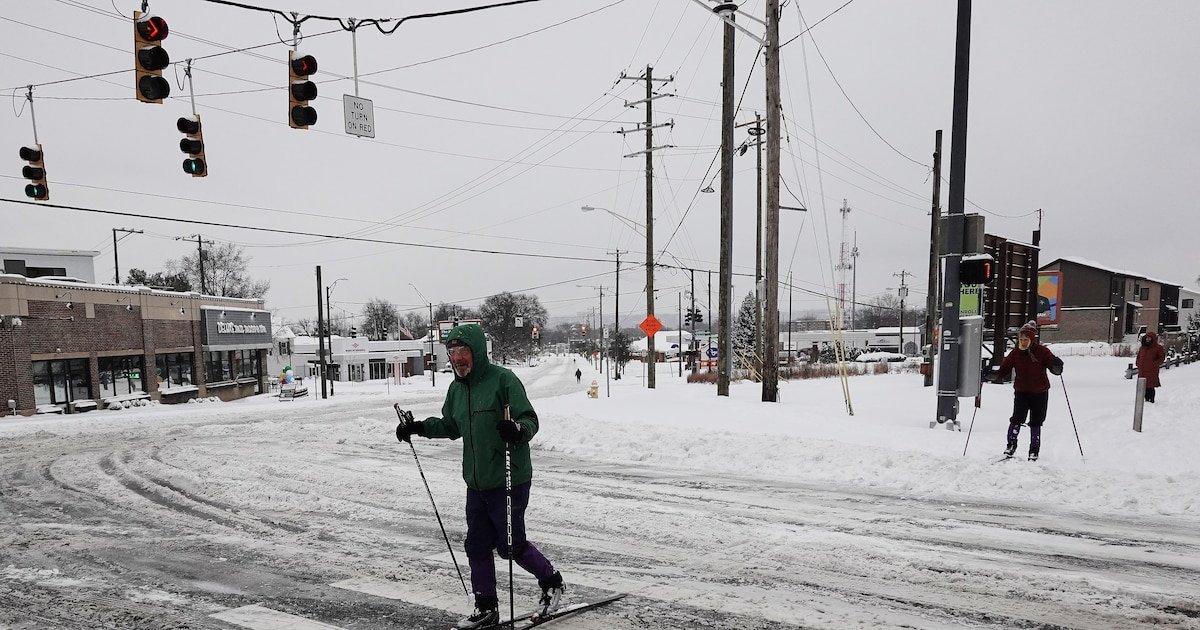
Una tormenta invernal de gran magnitud impactará a California y Nevada desde la noche del domingo 15 de febrero, con previsiones oficiales que anticipan acumulados de nieve por encima de los 2 metros en zonas montañosas y vientos de hasta 160 kilómetros por hora. Este evento, informado por el National Weather Service (NWS), se mantendrá hasta la noche del miércoles 18 de febrero y afectará principalmente a la región de la Sierra Nevada y el área de Lake Tahoe, donde las autoridades prevén complicaciones para la movilidad y los servicios esenciales.
De acuerdo con el NWS, la advertencia de tormenta invernal entrará en vigor el domingo por la noche, con previsión de acumulaciones de nieve de entre 90 y 240 centímetros en altitudes superiores a 1.800 metros. Los vientos serán intensos, con ráfagas que podrían superar los 160 kilómetros por hora en áreas elevadas, lo que aumentará el riesgo de caída de árboles y cortes de energía. El Weather Prediction Center de la NOAA coincide en que este será uno de los episodios más severos de la temporada para el oeste de Estados Unidos.
Las tormentas invernales intensas son recurrentes en la Sierra Nevada durante los meses de enero y febrero, pero la magnitud prevista para este episodio ha llevado a que las autoridades estatales y federales activen protocolos de emergencia. En temporadas anteriores, eventos similares han ocasionado cierres prolongados en rutas como la Interestatal 80 y la autopista 50, así como afectaciones en el acceso a servicios básicos en comunidades de montaña, según datos oficiales del NWS.
El NWS ha informado que la tormenta invernal se iniciará durante la noche del domingo 15 de febrero y se prolongará al menos hasta la noche del miércoles 18 de febrero. Durante este lapso, se esperan las mayores acumulaciones de nieve y los vientos más intensos en la Sierra Nevada, el área de Lake Tahoe y condados aledaños en California y Nevada.
El NWS Hanford especificó que la advertencia abarca parques nacionales como Yosemite, Sequoia y Kings Canyon, así como regiones del norte como Shasta y Plumas. Las primeras horas del lunes marcarán el inicio de las condiciones más severas, con incrementos progresivos en la intensidad del viento y la caída de nieve.
Según el NWS Hanford, la Sierra Nevada central y sur recibirá acumulaciones de nieve de 90 a 150 centímetros entre los 1.800 y 2.400 metros de altitud, con máximos que podrán superar los 210 centímetros en los puntos más elevados. Las cotas medias, a partir de 1.200 metros, podrían registrar entre 30 y 60 centímetros de nieve.
El NWS Sacramento estima que los condados de Shasta, Plumas y el parque nacional Lassen podrían recibir entre 30 y 60 centímetros de nieve en altitudes bajas, y hasta 240 centímetros en las cumbres. El NWS Reno proyecta en el área de Mono e Inyo acumulados de entre 40 y 120 centímetros, con ráfagas de viento superiores a 160 kilómetros por hora en las crestas.
El NWS Las Vegas ha advertido también sobre acumulaciones superiores a 60 centímetros en las laderas orientales de la Sierra y las White Mountains, y acumulados de entre 25 y 40 centímetros en cotas medias. Algunas zonas bajas, incluyendo valles del norte de California, podrían experimentar nevadas menores, pero suficientes para dificultar el tránsito regional.
El pronóstico oficial del NWS anticipa que los principales corredores de montaña, vitales para el transporte regional y el acceso a áreas recreativas, se verán afectados por la intensidad de la tormenta. Se prevé que los desplazamientos serán muy difíciles o imposibles durante los momentos de mayor acumulación de nieve y viento.
La Interestatal 80 y la autopista 50, rutas clave para la comunicación entre el oeste y el este de California y Nevada, podrían cerrar de manera intermitente o mantener controles de cadenas obligatorias para vehículos. El NWS Reno subrayó que habrá riesgo de visibilidad nula y posibles cierres prolongados por acumulación de nieve y caída de árboles o tendido eléctrico.
El Weather Prediction Center de la NOAA incluyó a gran parte de la región occidental de Estados Unidos en su mapa de riesgos para la semana, con especial énfasis en California y Nevada debido a la magnitud del evento.
La Oficina de Servicios de Emergencia de California (Cal OES) ha activado planes de contingencia para coordinar la respuesta ante incidentes derivados de la tormenta invernal. Entre las medidas previstas se encuentran el despliegue de maquinaria pesada para despejar carreteras, el refuerzo de cuadrillas eléctricas y la instalación de centros de información para residentes y viajeros.
El NWS mantiene contacto permanente con los gobiernos estatales y locales para actualizar las alertas y difundir recomendaciones. El organismo recordó que “las condiciones meteorológicas pueden cambiar con rapidez y los pronósticos de nevadas extremas suelen ajustarse conforme se acerca el evento”. El monitoreo de la tormenta se realiza con herramientas satelitales y modelos predictivos actualizados.
El NWS recomienda evitar desplazamientos no esenciales durante el periodo de la tormenta. Para quienes deban viajar, la institución sugiere llevar cadenas para neumáticos, mantas, agua, alimentos no perecederos, linternas y baterías de repuesto. El organismo advirtió que “las personas que deban viajar por motivos inaplazables deben considerar la posibilidad de quedar varadas por varias horas”.
Los residentes en zonas de montaña han sido instados a prepararse para posibles cortes de energía y dificultades de acceso. La acumulación de nieve sobre techos, automóviles y caminos incrementa los riesgos estructurales y de movilidad. El NWS Hanford y el NWS Sacramento reiteran la importancia de seguir las actualizaciones oficiales que se difundirán a través de los canales gubernamentales.
El invierno de 2023 registró tormentas invernales de características similares en la Sierra Nevada, con acumulados altos y efectos sobre el transporte y la vida de las comunidades de montaña. Según la NOAA, la nieve extrema en la Sierra tiene un impacto directo en el abastecimiento de agua de California, ya que el deshielo primaveral alimenta los embalses estatales.
El área de Lake Tahoe y las estaciones de esquí de la Sierra suelen anticipar estas situaciones reforzando protocolos de seguridad. La intensidad prevista para este episodio se ubica en el rango superior de los registros recientes, lo que explica el nivel elevado de alerta y la movilización de recursos estatales y federales.
El NWS prevé que las nevadas intensas continuarán hasta la noche del miércoles 18 de febrero, aunque algunas áreas de montaña podrían registrar acumulaciones adicionales si persisten las condiciones atmosféricas. Las autoridades mantienen la recomendación de evitar traslados innecesarios y permanecer atentos a las indicaciones oficiales.
La situación será monitoreada de manera continua a través de los sitios web y canales de comunicación del NWS, la NOAA y las agencias estatales de emergencia, donde se actualizará la información sobre rutas, servicios y evolución meteorológica.
climate,extreme weather,snow,weather,winter storm

 POLITICA2 días ago
POLITICA2 días agoA quién afecta la Reforma laboral: estos son los puntos clave del proyecto de Milei

 POLITICA2 días ago
POLITICA2 días agoReforma laboral: la modificación sobre accidentes o enfermedades ajenas al trabajo

 ECONOMIA2 días ago
ECONOMIA2 días agoCayeron 20% las ventas de automóviles en China y el régimen impone medidas para regular el mercado











